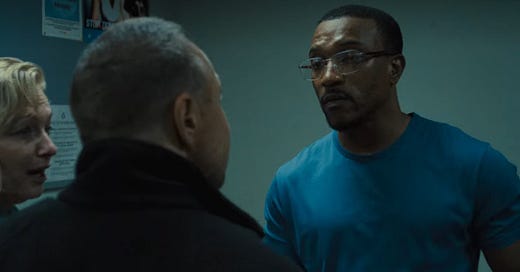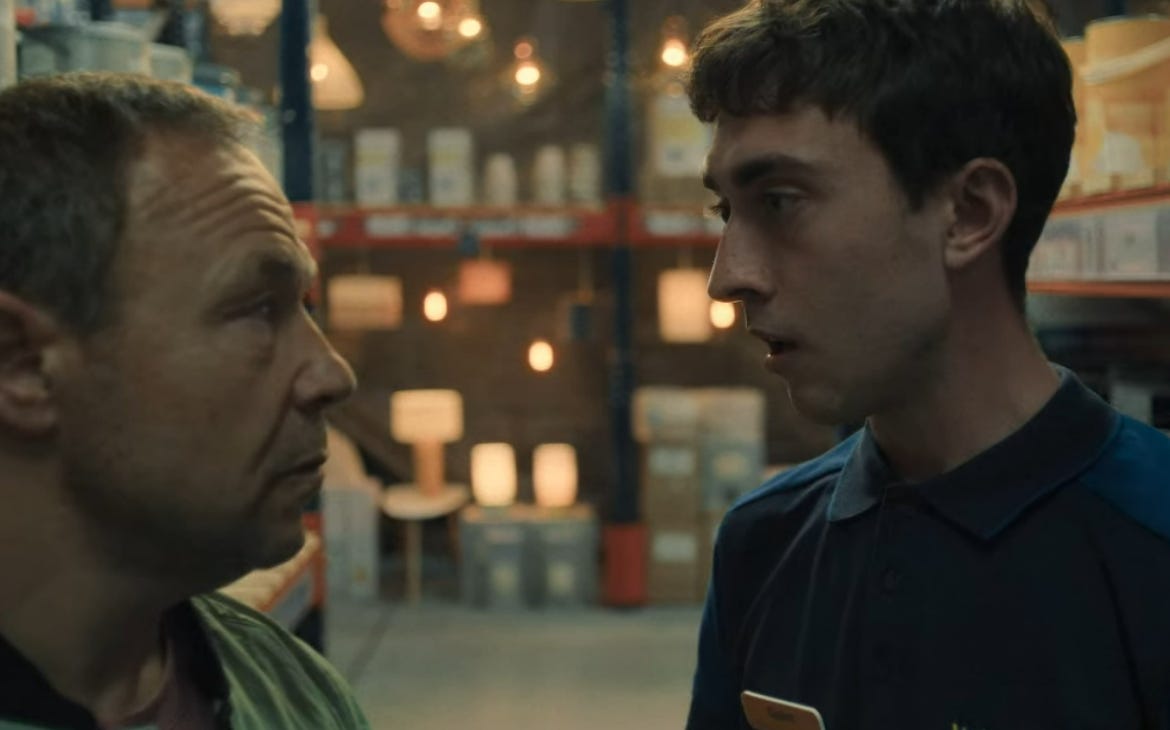
Adolescence: a manosphere morality tale
A show so heavy-handed it makes me want to start talking about 'regime propaganda'.
A version of this article was previously published in The Critic on the 24th March.
I’m not normally one for using phrases like ‘regime propaganda’, but having just finished Adolescence, it’s hard to resist. It’s a heavy handed morality tale that clearly wants to ‘shape the conversation’, but it’s so obviously designed with this in mind that it doesn’t portray the subjects it’s talking about accurately at all. As a result, it’s hard to take it as seriously as it wants to be taken, in particular the idea that it is of such insight that it should be shown in schools and in Parliament.
The tone is set from the opening, an absurd SWAT team style dawn arrest of the 13 year old suspect Jamie in an unidentified northern suburb, probably of Doncaster. Our police officer main characters, the black, MLE accented DI Bascombe paired with the no-nonsense northern female sergeant, makes the viewer feel like they’re in one of those modern TV adverts where an implausibly constituted family settles down to have a lovely British cup of tea together.
In contrast to the blinking confusion of the family of the accused, the procedural British state is lovingly presented, with all its required safeguarding procedures meticulously carried out. The sense is of a weary but knowing institution grinding its way towards justice. Compensation is duly offered for the destruction of the family’s front door in the arrest, while once at the station DI Bascombe dispatches their accusations of unreasonable force being used in the arrest by confirming the proper procedures: chastened, the family sit down and await the next steps of the process.
Once Jamie has been properly processed and CCTV evidence of him carrying out the murder produced, we switch in episode 2 to the search at his school for the motive and murder weapon. The school, interestingly, is treated with far less reverence than the police, being portrayed as a chaotic place staffed by incompetents. While at the school, DI Bascombe’s son Adam reveals to him what he’s been missing, the importance of the manosphere to the murder. He goes on to tell his dad about the manosphere, the red pill and the 80-20 rule - that 80% of women are attracted to 20% of men - sounding a lot more like the way a TV producer who had been searching the internet would describe things than how a teenage boy would. The police then describe this to a teacher as the ‘involuntary celibate stuff. It’s the Andrew Tate shite’.
Episode 3 is where we see Jamie being interviewed seven months later by the psychologist Briony - this is the scene which has generated such a rich set of memes. Jamie is asked what he thinks about masculinity, what being a man feels like, and what he feels about his dad and granddad. He reveals he doesn’t like sport, that he believes his father was ashamed of him for not performing on the football field, that his mum can cook a roast but not much else. After an altercation with him Briony leaves but then returns and continues with the same line of questioning, asking whether he, or his dad, have any female friends and whether he follows models on Instagram. Eventually Jamie reveals that he had asked Katie, the murder victim, out after seeing a topless picture of her, thinking her to be weak and desperate. While still denying the murder, he admits that her rejection of him and humiliation on Instagram is what drove his anger towards her: “she’s a bitch, I should have killed her but I didn’t.”
The final episode follows Jamie’s family as they struggle with the stresses his actions have caused them and deal with the news that he has decided to plead guilty. They wonder if they could have spent more time with him and whether they should have prevented him from spending too much time in his room on his computer. Here we have a couple more clunkily inserted moral warnings. Jamie’s father Eddie encounters an intense young man in a DIY store who doesn’t believe Jamie did it - clearly he has been encountering dangerous misinformation on the internet. Eddie later reveals that he too has been served woman-hating manosphere content on his phone when searching for gym routines. The message all wrapped up, the series then ends in tears and regret.
The overall message of Adolescence is that you, you nice normal parents watching this, could be harbouring a potential murderer if your son reads too many problematic ideas about masculinity online. But the show is guilty of conflating different phenomena: incels, Andrew-Tate style manosphere influencer culture, and knife crime. Jamie is portrayed as a cherubic 13 year old who spends too much time in his bedroom but who has a loving family and no previous criminal or violent history. But the two real life cases the series were based on were utterly different. 17 year old Hassan Sentamu, who stabbed 15 year old Elianne Andam to death in Croydon 2023, had been in foster care and had been in trouble with the police since age 12 for carrying knives and being violent towards girls. The unnamed 14 year old who murdered 12 year old Ava White in Liverpool in 2021 had been involved with the police so many times that he knew exactly what to expect on his arrest: “they always take my phone. I have had a few phones took when I was in the police station.”
Teenage boys inherently act pretty horribly, and doubtless Andrew Tate style manosphere content influences some to behave even worse; the Instagram bullying and the nude pictures of the victim making their way round the school rang truer than the murder did and would have made a more realistic basis for the drama. But this sort of stuff is not the same phenomenon as knife crime, and nor, really, of incels.
This sort of conflation is characteristic of commentary on the manosphere more generally. This Guardian article of a few days ago: Beyond Andrew Tate: the imitators who help promote misogyny online is one example. It bizarrely lumps Jordan Peterson (due to his advocacy of ‘traditional masculine values of courage, self-discipline and order’) in with those like Sneako who espouse views like Tate himself. One striking thing evident in the article (and perhaps this is the reason that Peterson was included, to balance things out), is how non-white manosphere influencers are. This is another difficult thing for the sorts of people who are lauding Adolescence to accept, given their tendency to believe that the things that they like (diversity, respect for women) all come as one package, and all the things they dislike (racism, sexism, homophobia) do too. But all the evidence is that the manosphere is disproportionately non-white and that Andrew Tate is more popular among black and asian men than white men.
None of this is likely to interest those calling for Adolescence to be treated as a documentary and to be shown in schools and in Parliament. As with so many other examples recently, such as the way that David Amess’s murder was used to justify the Online Safety Bill, we are seeing the prioritisation of preconceived ideas over the real causes.










